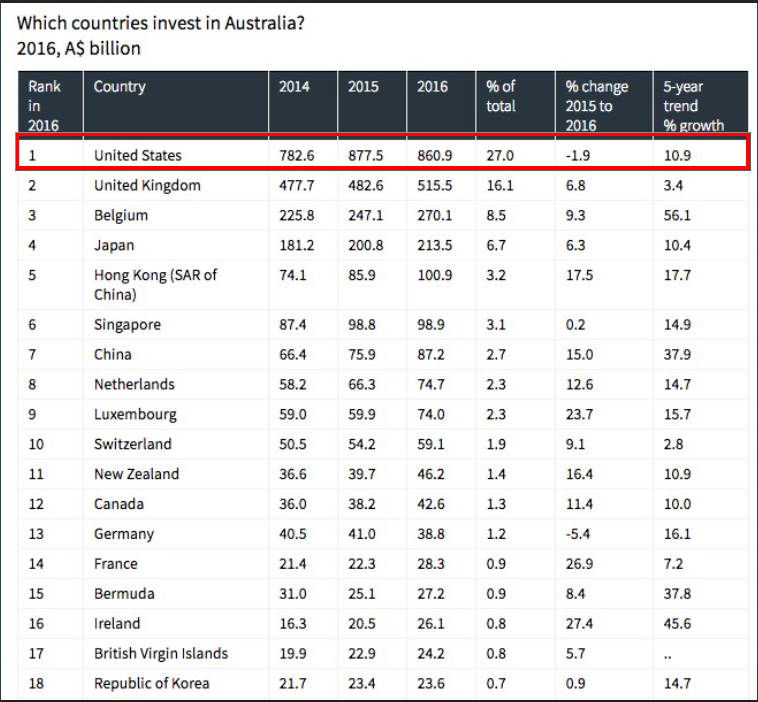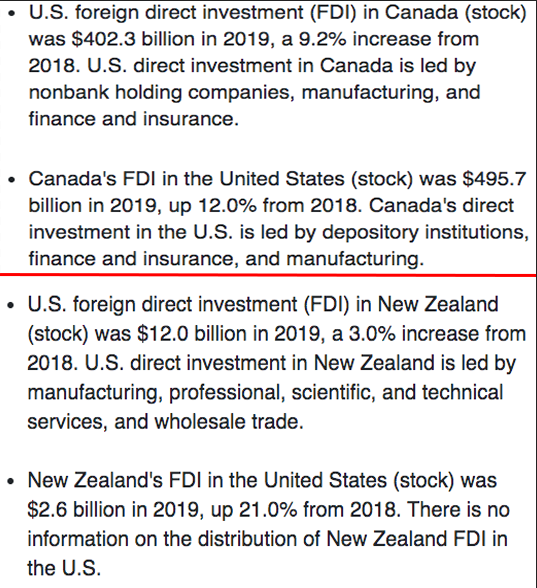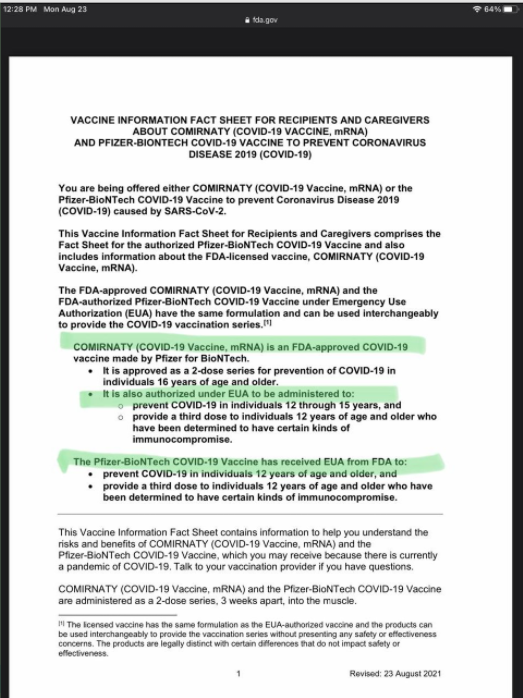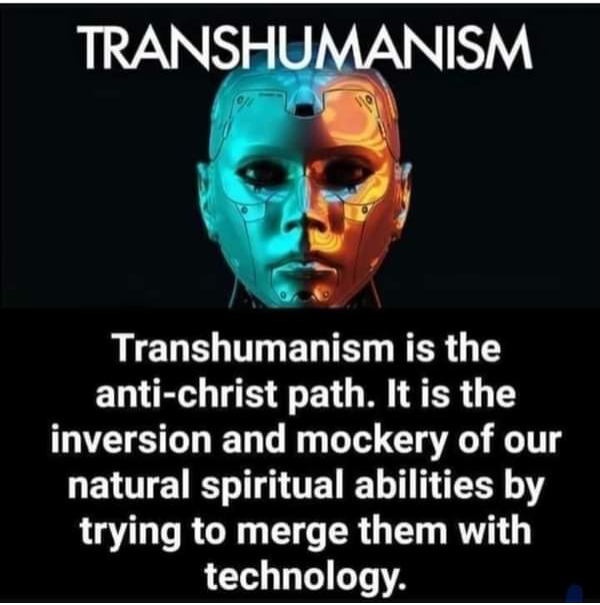It looks like you're using an Ad Blocker.
Please white-list or disable AboveTopSecret.com in your ad-blocking tool.
Thank you.
Some features of ATS will be disabled while you continue to use an ad-blocker.
share:
FivEyes Cause and Effect?


Imposing Certain Sanctions in the Event of Foreign Interference in a United States Election
Did Team Joe prevent the investigation from happening or not? Or was the investigation handled by a different system that Team Joe had no control over - ie. military or others?
Is the free-fall we see in Australia, Canada and NZ due to this confiscation of assets and the ramifications of that?


Imposing Certain Sanctions in the Event of Foreign Interference in a United States Election
(a) Not later than 45 days after the conclusion of a United States election, the Director of National Intelligence, in consultation with the heads of any other appropriate executive departments and agencies (agencies), shall conduct an assessment of any information indicating that a foreign government, or any person acting as an agent of or on behalf of a foreign government, has acted with the intent or purpose of interfering in that election.
Sec. 2. (a) All property and interests in property that are in the United States, that hereafter come within the United States, or that are or hereafter come within the possession or control of any United States person of the following persons are blocked and may not be transferred, paid, exported, withdrawn, or otherwise dealt in: any foreign person determined by the Secretary of the Treasury, in consultation with the Secretary of State, the Attorney General, and the Secretary of Homeland Security:
Did Team Joe prevent the investigation from happening or not? Or was the investigation handled by a different system that Team Joe had no control over - ie. military or others?
Is the free-fall we see in Australia, Canada and NZ due to this confiscation of assets and the ramifications of that?

twitter.com...


Bryan Dean Wright website
Always a Hollywood connection. Judging by his twitter feed only, he appears to be on our side.
Conrad Brean motto: “Change the story, change the lead.”
― Wag The Dog (1997)
originally posted by: cherokeetroy
a reply to: angelchemuel
I, myself, do not understand Trump's stance on the vaccine. At all. He knows these people are sick, he knows these people are evil. He knows they are destroying our country. He knows there are lies and deception surrounding the origins of the pandemic. Yet, with all the mountains of lies and Fake News surrounding everything else, we can trust what they tell us about the vaccines? Is he not being properly briefed on the data about vaccine injury and death? Is he not informed about the massive unrest that's taking place because of this controversy? He needs to be called out publicly on this issue. If he continues on this path he is going to erode trust and lose the support of his followers. His ambiguity is going to create division and will demoralize the movement. I know my opinion won't be a popular one. I'm sorry, I call it like I see it.
Ah yes, our old friend ambiguity.
It seems like most everything has an aspect of ambiguity to it now.
Well, maybe not Biden. That he is a disaster is crystal clear.
But most everything else.
Sometimes it suggests that this whole series of events is about forcing people to confront a choice point.
A spiritual choice point.
The thing about a spiritual choice is that it is not based on material evidence, especially not overwhelming evidence. A choice based in the material world is based on pros and cons, balancing evidence, practicality and logic.
A choice made on these external factors is not a choice, but a reaction. A spiritual choice comes from within based on character, and is not made for you by reacting to how some objective external scales tip. Or what someone tells you to do.
Think of it as a test. You find a wallet with money in it. The practical choice is to keep it. The spiritual choice is to give it back. There is an aspect of ambiguity. You could do either one. You are not compelled by outside factors one way or the other. You are forced to decide for yourself.
The spiritual choice comes from dilemma. If the evidence is clear-cut, there is no dilemma. The choice becomes a practical one, not a spiritual one.
a reply to: EndtheMadnessNow
That Predaxa anticoagulant..... I know what I'm thinking and it's upsetting me.
Sad Rainbows
Jane
That Predaxa anticoagulant..... I know what I'm thinking and it's upsetting me.
Sad Rainbows
Jane
a reply to: angelchemuel
What I'm thinking is that without the life saving Predaxa, people die. Force the vax then be good and pay up or we shut you off. If Mommy or Daddy get out of line, no Predaxa for baby. If this scenario comes about, all merciless Hell will be unleashed on the perpetrators.
What I'm thinking is that without the life saving Predaxa, people die. Force the vax then be good and pay up or we shut you off. If Mommy or Daddy get out of line, no Predaxa for baby. If this scenario comes about, all merciless Hell will be unleashed on the perpetrators.
a reply to: underpass61
Go Aussies. The salt of the Earth Aussies don't take any crap. The Kiwis will rise up soon, too, and get rid of the dictator that is running them into the ground.
Go Aussies. The salt of the Earth Aussies don't take any crap. The Kiwis will rise up soon, too, and get rid of the dictator that is running them into the ground.
a reply to: cimmerius
That is what I'm feeling. Deep down in my soul I feel something is wrong or off about this jab. Most of my immediate family feels the same. I am more afraid of the vax than the C-flu, that I will compromise my spiritual welfare if I take it. So many friends I know have taken the vax and seem to be okay. Maybe I'm being foolish. Right now I just can't.
That is what I'm feeling. Deep down in my soul I feel something is wrong or off about this jab. Most of my immediate family feels the same. I am more afraid of the vax than the C-flu, that I will compromise my spiritual welfare if I take it. So many friends I know have taken the vax and seem to be okay. Maybe I'm being foolish. Right now I just can't.
a reply to: cimmerius
We all have the choice to completely emotionally detach ourselves from this "game". We can choose to stop watching the show and stop feeding this system with our thoughts and our energy. Or we can even choose to continue watching and partipating but from a completely neutral or higher vibrational standpoint. All of these choices enable us to detangle ourselves from the chaos and confusion of the hivemind and instead align ourselves with the clarity of the internal guidance that comes from our innate sense of what's beneficial or detrimental to our own spiritual growth and evolution. This spiritual journey is a solo journey toward self-sovereignty. Trump may be playing a dual role in this awakening -- empowering people by forcing them to turn inward and reactivating their own intuition and/or reliance on a higher power for answers. His ambiguity may be a catalyst to speed things along, pressuring people to pick a timeline which will lead us to divergence. Or convergence, whichever way you want to look at it. Plot twist... Trump ain't such a good guy after all (from the standpoint of him being pro vaxx/pro corruption and a necessary evil in the plot as events unfold).. . I have definitely considered this scenario. All the "bad guys" in this sim are serving as catalysts for our growth
We all have the choice to completely emotionally detach ourselves from this "game". We can choose to stop watching the show and stop feeding this system with our thoughts and our energy. Or we can even choose to continue watching and partipating but from a completely neutral or higher vibrational standpoint. All of these choices enable us to detangle ourselves from the chaos and confusion of the hivemind and instead align ourselves with the clarity of the internal guidance that comes from our innate sense of what's beneficial or detrimental to our own spiritual growth and evolution. This spiritual journey is a solo journey toward self-sovereignty. Trump may be playing a dual role in this awakening -- empowering people by forcing them to turn inward and reactivating their own intuition and/or reliance on a higher power for answers. His ambiguity may be a catalyst to speed things along, pressuring people to pick a timeline which will lead us to divergence. Or convergence, whichever way you want to look at it. Plot twist... Trump ain't such a good guy after all (from the standpoint of him being pro vaxx/pro corruption and a necessary evil in the plot as events unfold).. . I have definitely considered this scenario. All the "bad guys" in this sim are serving as catalysts for our growth
edit on 23-8-2021 by cherokeetroy because: (no reason given)
a reply to: pteridine
Well....
i know children get clots very often it's a hereditary condition. I forget the name now. I'm very glad too they have developed one in oral form. However, it was the fact it is available in oral form that got me thinking two things.
First, they need to get this one out there if they are rolling out the vaccines to younger and younger children. Many will develop clots. Can you imagine trying to give a sick child that understands he is sick because of a jab and now he would need possibly daily jabs to save his life? The trauma alone is horrid.
Then I saw this in relation to the newly licensed Pfizer jab.
So I felt a bit better, until I had this thought.....If that's the case, then it's not safe to give to adults either!
My second but more 'obscure' thought was..... what if there is any truth to transference/shedding....are we going to start seeing massive spikes in childhood coagulopathy? That one doesn't even bear thinking about!
Rainbows
Jane
Well....
i know children get clots very often it's a hereditary condition. I forget the name now. I'm very glad too they have developed one in oral form. However, it was the fact it is available in oral form that got me thinking two things.
First, they need to get this one out there if they are rolling out the vaccines to younger and younger children. Many will develop clots. Can you imagine trying to give a sick child that understands he is sick because of a jab and now he would need possibly daily jabs to save his life? The trauma alone is horrid.
Then I saw this in relation to the newly licensed Pfizer jab.
The FDA is not recommending that children under age 12 get the vaccine because there is not “proper data” proving its safety.
So I felt a bit better, until I had this thought.....If that's the case, then it's not safe to give to adults either!
My second but more 'obscure' thought was..... what if there is any truth to transference/shedding....are we going to start seeing massive spikes in childhood coagulopathy? That one doesn't even bear thinking about!
Rainbows
Jane
originally posted by: underpass61
Australian truckers planning on shutting down the country-
God bless them!
Name change.
Long time readers of this thread saw this coming and know exactly what it means. "will now be marketed as Comirnaty (koe-mir’-na-tee)"
FDA's Lying Drivel

Biggerish
Name changes always matter, they are not frivolous as the draco shills want people to believe.
Gematria 713, 708, 118
The End Of Days
Claims Do Not Matter
The Great Reset
Microsoft
The Storm
Reject The Vaccine
And strangely entered into the data base a Mr. Pool tweet: Thginrevo
Pfizer Comirnaty Gematria
Flatten the Curve
He spied on my campaign and got caught
Can you handle the truth
Wuhan Corona
Calm before the storm
President Trump
Kabbalistic reduction
Long time readers of this thread saw this coming and know exactly what it means. "will now be marketed as Comirnaty (koe-mir’-na-tee)"
FDA's Lying Drivel

Biggerish
Name changes always matter, they are not frivolous as the draco shills want people to believe.
Gematria 713, 708, 118
The End Of Days
Claims Do Not Matter
The Great Reset
Microsoft
The Storm
Reject The Vaccine
And strangely entered into the data base a Mr. Pool tweet: Thginrevo
Pfizer Comirnaty Gematria
Flatten the Curve
He spied on my campaign and got caught
Can you handle the truth
Wuhan Corona
Calm before the storm
President Trump
Kabbalistic reduction

Mad Scientist Initiative
Mad Scientist is a U.S. Army Training and Doctrine Command (TRADOC) initiative. It is a community of action that explores the future operational environment and its military implications. Mad Scientist continually explores the future, connecting and creating collaborative partnerships between academia, industry, and government.
Key topics and themes addressed:
Robotics, Artificial Intelligence and Autonomy, co-hosted with Georgia Tech Research Institute: All things in the future operational environment will be smart, connected and self-organizing; artificial intelligence (AI) and humans must co-evolve, and human teaming with AI enablers will be the best instantiation of general intelligence supporting commanders on the future battlefield.
The Enemy after Next, co-hosted with NASA Langley Research Center: The next fight will be characterized by electrons versus electrons, while the fight after next will be characterized by AI vs. AI algorithm versus algorithm - how AI is structured and integrated will be the strategic advantage.
Visualizing Multi-Domain Battle 2030-2050, co-hosted with Georgetown University: Bio-convergence with advanced computing is occurring; humans will become part of the network connected through embedded and worn devices; smart cities are emerging, and tech speed and convergence will challenge society’s and the Army’s policies and ethics.
www.army.mil...
Biometrics Could Hold the Key to Vaccine Passports
Any kind of document, especially a passport, needs to be built on a foundation that allows it to operate across borders and jurisdictions. Biometrics could be the easiest and fastest path to get started. It can add convenience and security, while identifying a person’s vaccination status easily.
Modern biometric solutions have many different modalities at their disposal, from fingerprints and face to voice and iris recognition. The biometric modalities most likely to be used for vaccine passports, however, are anticipated to be face or voice recognition, as these can easily be performed on an existing mobile device. For a person to access a vaccine passport they would present their face or voice as part of the authentication process instead of entering a username or password or answering a security question.
techspective.net...=IwAR0inAXJows0DRbYURWCtmrTgYTrLhYEtDaCjJprztI7ovvBS IKEnTOOzZY
Biometric identity: the key to security for smart cities
connected systems need a way to identify each user and tailor everything to their preferences. With a biometric ID card, or city card with fingerprint authentication, users can authenticate themselves and connect to systems based on personal information. This means all technology in a smart city, from lighting choices to building temperatures, can be attuned to each identity allowing citizens to enjoy personalised city experiences.
In a smart city every interaction and every touchpoint becomes a potential source of data. In fact, this includes hardware, household goods, cars, cameras and smartphones. However, many devices and systems aren’t cyber-resilient, posing a threat to the safety and security of people’s data . Home assistants and other smart technology that have the power to monitor aspects of our everyday lives - gives huge companies access to lots of data, which is valuable even where that data is anonymised. However, they can be a serious threat to people’s privacy – consumers are handing valuable information over freely and often without realising it.
www.itproportal.com... u5umBS7kV0qixtTHk
Biodigital Convergence: The Deep State’s Plan to Tie Everyone to the AI Control Grid Physically
Policy Horizons Canada (Policy Horizons) declares itself as “a strategic foresight organization within the Government of Canada with a mandate to help the Government develop future-oriented policy and programs that are more robust and resilient in the face of disruptive change on the horizon. “
The Foreword of its Director General Kristel Van der Elst, says it all:
In the coming years, biodigital technologies could be woven into our lives in the way that digital technologies are now. Biological and digital systems are converging, and could change the way we work, live, and even evolve as a species. More than a technological change, this biodigital convergence may transform the way we understand ourselves and cause us to redefine what we consider human or natural.
What is biodigital convergence?
Biodigital convergence is the interactive combination, sometimes to the point of merging, of digital and biological technologies and systems. Policy Horizons is examining three ways in which this convergence is happening.
1 Full physical integration of biological and digital entities. 2 Coevolution of biological and digital technologies. 3 Conceptual convergence of biological and digital systems
geopolitics.co... 61C5tKd9Vm98U_al5zWrDoi2ebf1cOFXW7rGsjrTfzkZAzUlksQo
The Internet of Bio-Nano Things
University of Maryland (UMD) researchers are one step closer to bridging the gap between microelectronics and biological systems, a critical obstacle to transforming today’s smart devices – such as watches or fitness bands – into potentially life-saving technology. Their latest findings were published this week in Nature Nanotechnology.
Building on this process, Bentley’s and Payne’s teams joined forces with synthetic biology experts BIOE alumna Jessica Terrell (Ph.D. ‘15) and her colleagues at the U.S. Army Research Lab, and BIOE alumna Tanya Tschirhart (Ph.D. ‘14) and her colleagues at the U.S. Naval Research Lab. Together, they worked to create a microbial network they could "plug into" an external electronic system to interrogate and control biological function in real time. The collaborative team crafted an electronic system and a community of engineered microbial cells to create an electronically controlled biological local area network, dubbed a BioLAN.
eng.umd.edu...
How agritech is creating an urban farming ecosytem
Today, technology is enabling the development of next-generation urban farms like AbyFarm, a local agritech player. AbyFarm is a Singapore-based agri-tech company with a fully integrated unmanned self-sustainable smart farm-to-table platform. Aby Farm uses intelligent AI cloud-driven machinery — IOT, sensors, machinery, blockchain, data analysis, high-tech self-regulating farming system to attain high yield, high sustainability, and high traceability for food security.
techwireasia.com...
Ethiopia to register 5 million school children on the blockchain
In April, Ethiopia’s government signed a deal with three companies to create a national database for student and teacher IDs using a digital decentralised identity. The idea is to provide IDs for the country’s 5 million students spread out across its 3500 schools. The digitized identity will help students in primary, secondary, and university track their education careers and future progression.
www.techinafrica.com...
The deal made ripples in the crypto community as it stands out as the largest of its kind entered into by a government. It also showcased a unique for blockchain to be used to effect socio-economic change. The deal has been touted as a great way to ensure financial inclusion in Ethiopia and Africa as it creates digital identities of persons

twitter.com...
National Security Adviser Jake Sullivan: "I'm trying to give you the straight dope from here."
twitter.com...



twitter.com...
FDA clears Synchron's brain-computer interface device for human trials
www.engadget.com...
A company that makes an implantable brain-computer interface (BCI) has been given the go-ahead by the Food and Drug Administration to run a clinical trial with human patients. Synchron plans to start an early feasibility study of its Stentrode implant later this year at Mount Sinai Hospital, New York with six subjects. The company said it will assess the device's "safety and efficacy in patients with severe paralysis."
Synchron received the FDA's green light ahead of competitors like Elon Musk’s Neuralink. Before such companies can sell BCIs commercially in the US, they need to prove that the devices work and are safe. The FDA will provide guidance for trials of BCI devices for patients with paralysis or amputation during a webinar on Thursday.
Another clinical trial of Stentrode is underway in Australia. Four patients have received the implant, which is being used "for data transfer from motor cortex to control digital devices," Synchron said. According to data published in the Journal of NeuroInterventional Surgery, two of the patients were able to control their computer with their thoughts. They completed work-related tasks, sent text messages and emails and did online banking and shopping.
www.engadget.com...
new topics
-
Steering the Titantic from the Drydock.
US Political Madness: 2 hours ago -
Paramilitary Leaks - John Williams
Whistle Blowers and Leaked Documents: 11 hours ago
top topics
-
House Passes Laken Riley Act
Mainstream News: 13 hours ago, 23 flags -
What Comes After January 20th
Mainstream News: 16 hours ago, 18 flags -
Hearing more ambulances lately
Medical Issues & Conspiracies: 13 hours ago, 7 flags -
Los Angeles brush fires latest: 2 blazes threaten structures, prompt evacuations
Mainstream News: 13 hours ago, 7 flags -
Paramilitary Leaks - John Williams
Whistle Blowers and Leaked Documents: 11 hours ago, 6 flags -
Let's Buy Greenland
General Chit Chat: 17 hours ago, 6 flags -
Those stupid GRAVITE commercials
Rant: 16 hours ago, 5 flags -
Steering the Titantic from the Drydock.
US Political Madness: 2 hours ago, 5 flags -
The more I think about it
General Chit Chat: 14 hours ago, 4 flags -
Canada as a state .. how would it work?
General Chit Chat: 16 hours ago, 4 flags
active topics
-
Let's Buy Greenland
General Chit Chat • 17 • : GENERAL EYES -
Gravitic Propulsion--What IF the US and China Really Have it?
General Conspiracies • 35 • : bastion -
Steering the Titantic from the Drydock.
US Political Madness • 3 • : ufoorbhunter -
Meta Llama local AI system is scary good
Science & Technology • 49 • : glend -
Canada as a state .. how would it work?
General Chit Chat • 17 • : FlyersFan -
-@TH3WH17ERABB17- -Q- ---TIME TO SHOW THE WORLD--- -Part- --44--
Dissecting Disinformation • 3968 • : AianawaQ1320 -
Post A Funny (T&C Friendly) Pic Part IV: The LOL awakens!
General Chit Chat • 8000 • : KrustyKrab -
Los Angeles brush fires latest: 2 blazes threaten structures, prompt evacuations
Mainstream News • 13 • : BeyondKnowledge3 -
House Passes Laken Riley Act
Mainstream News • 16 • : KrustyKrab -
Planned Civil War In Britain May Be Triggered Soon
Social Issues and Civil Unrest • 16 • : Freeborn

